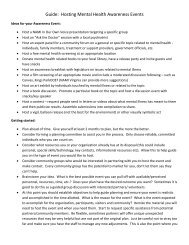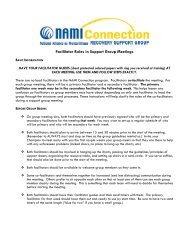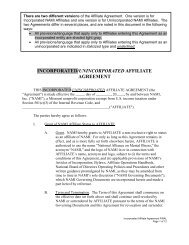Famous People with Mental Illness Powerpoint - NAMI Virginia
Famous People with Mental Illness Powerpoint - NAMI Virginia
Famous People with Mental Illness Powerpoint - NAMI Virginia
You also want an ePaper? Increase the reach of your titles
YUMPU automatically turns print PDFs into web optimized ePapers that Google loves.
<strong>Famous</strong><br />
<strong>People</strong> <strong>with</strong><br />
<strong>Mental</strong><br />
<strong>Illness</strong>
Abraham Lincoln<br />
The revered sixteenth President of the United<br />
States suffered from severe and incapacitating<br />
depressions that occasionally led to thoughts of<br />
suicide, as documented in numerous biographies<br />
by Carl Sandburg.
<strong>Virginia</strong> Woolf<br />
The British Novelist who wrote To the Lighthouse<br />
and Orlando experienced the mood swings of<br />
bipolar disorder characterized by feverish periods<br />
of writing and weeks immersed in gloom. Her<br />
story is discussed in The Dynamics of Creation by<br />
Anthony Storr.
Lionel Aldridge<br />
A defensive end for Vince Lombardi’s legendary<br />
Green Bay Packers of the 1960’s, Aldridge played<br />
in two Super Bowls. In the 1970’s, he suffered<br />
from schizophrenia and was homeless from two<br />
and a half years. Until his death in 1988, he gave<br />
inspirational talks on his battle against paranoid<br />
schizophrenia. His story is the story of numerous<br />
newspaper articles.
Ludwig van Beethoven<br />
The brilliant composer experienced bipolar<br />
disorder, as documented in The Key to<br />
Genius: Manic Depression and the Creative<br />
Life by D. Jablow Hershman and Julian Lieb.
Eugene O’Neill<br />
The famous playwright, author of A Long Day’s<br />
Journey and Ah! Wilderness! , suffered from<br />
clinical depression, as documented in Eugene<br />
O’Neill by Olivia Coolidge.
Gaetano Donizetti<br />
The famous opera singer suffered from<br />
bipolar disorder, as documented in Donizetti<br />
and the World Opera in Italy, Paris, and<br />
Vienna in the First Half of the Nineteenth<br />
Century by Herbert Weinstock.
Leo Tolstoy<br />
Author of War and Peace, Tolstoy revealed the<br />
extent of his own mental illness in the memoir<br />
Confession. His experiences is also discussed in<br />
The Dynamics of Creation by Anthony Storr, and<br />
The Inner World of <strong>Mental</strong> <strong>Illness</strong>: A Series of First<br />
Accounts of What It Was Like by Bert Kaplan.
Vaslav Nijinsky<br />
The dancers battle <strong>with</strong> schizophrenia is<br />
documented in his autobiography, The Diary<br />
of Vaslov Nijinsky.
John Keats<br />
The renowned poet’s mental illness is<br />
documented in The Dynamics of Creation by<br />
Anthony Storr and The Broken Brain: The<br />
Biological Revolution in Psychiatry by Nancy<br />
Andreasen, M.D.
Tennessee Williams<br />
The playwright gave a personal account of his<br />
struggle <strong>with</strong> clinical depression in his own<br />
Memoirs. His experience is also documented in<br />
Five O’clock Angel: Letters of Tennessee Williams<br />
to Maria St. Just, 1948‐1982; The Kindness of<br />
Strangers: The Life of Tennessee Williams by<br />
Donald Spoto, and Tennessee: Cry of the Heart by<br />
Dotson.
Vincent Van Gogh<br />
The celebrated artist’s bipolar disorder is<br />
discussed in The Key to Genius: Manic Depression<br />
and the Creative Life by D. Jablow Hershman and<br />
Julian Lieb and Dear Theo, The Autobiography of<br />
Van Gogh.
Isaac Newton<br />
The scientist’s mental illness is discussed in The<br />
Dynamics of Creation by Anthony Storr and the<br />
Key to Genius: Manic Depression and the Creative<br />
Life by D. Jablow Hershman and Julian Lieb.
John Nash<br />
Nobel Prize Winner in mathematics, has faced a<br />
lifelong battle <strong>with</strong> schizophrenia. He was known<br />
as the “Phantom of Fine Hall” at Princeton where<br />
his reclusive, ghost like figure could be seen<br />
roaming around, leaving messages of his<br />
mathematical genus on the boards of empty<br />
classrooms. His struggle was well documented in<br />
the book ʺA Beautiful Mind,ʺ by Sylvia Nasar<br />
which was later made into a movie by the same<br />
name.
Ernest Hemmingway<br />
The Pulitzer Prize‐winning novelist’s suicidal<br />
depression is examined in the True Gen: An<br />
Intimate Portrait of Ernest Hemmingway by Those<br />
Who Know Him by Dennis Brian.
Sylvia Plath<br />
The poet and novelist ended her lifelong struggle<br />
<strong>with</strong> clinical depression by taking her own life, as<br />
reported in A Closer Look at Ariel: A Memory of<br />
Sylvia Plath by Nancy Hunter‐Steiner.
Michelangelo<br />
The mental illness of one of the world’s greatest<br />
artistic geniuses is discussed in The Dynamics of<br />
Creation, by Anthony Storr.
Winston Churchill<br />
“Had he been a stable and equable man, he could<br />
never have inspired the nation. In 1940, when all<br />
the odds were against Britain, a leader of sober<br />
judgment might well have concluded that we were<br />
finished, “ wrote Anthony Storr about Churchill’s<br />
bipolar disorder in Churchill’s Black Dog, Kafka’s<br />
Mice, and Other Phenomena of the Human Mind.
Vivien Leigh<br />
The Gone <strong>with</strong> the Wind star suffered from<br />
mental illness, as documented in Vivien Leigh: A<br />
Biography by Ann Edwards
Patty Duke<br />
The Academy Award‐winning actress told of her<br />
bipolar disorder in her autobiography and made‐<br />
for‐TV movie Call me Anna and A Brilliant<br />
Madness: Living <strong>with</strong> Manic‐Depressive <strong>Illness</strong>, co‐<br />
authored by Gloria Hochman.
Charles Dickens<br />
One of the greatest authors in the English<br />
language suffered from clinical depression, as<br />
documented in The Key to Genius: Manic<br />
Depression and the Creative Life by D. Jablow<br />
Hershman and Julian Lieb, and Charles Dickens:<br />
His Tragedy and Triumph by Edgar Johnson.
Thelonious Monk<br />
Jazz great Thelonious Monk struggled <strong>with</strong> mental<br />
illness during much of his later career. This pianist and<br />
composer was at the forefront of the bebop movement in<br />
the 1940s and 50s. Though his highly individual style<br />
was at first unpopular, he contributed a long list of<br />
standards to the jazz repertoire, including Straight, No<br />
Chaser and ʹRound Midnight. His recordings, which<br />
often coincided <strong>with</strong> erratic behavior, influenced a new<br />
generation of legends such as Miles Davis and Sonny<br />
Rollins. And in the 1960s his work at last became<br />
popular <strong>with</strong> mainstream fans, earning him the cover of<br />
Time magazine in 1964.<br />
| |
Jimmy Piersall<br />
The baseball player for the Boston Red Sox who<br />
suffered from bipolar depression detailed his<br />
experience in The Truth Hurts.
Jane Pauley<br />
NBC newsbroadcaster, since the age of 25, talks<br />
candidly about her depression and bipolar<br />
illnesses. In her new book, ʺSkywriting: A Life<br />
Out of the Blue.ʺshe tells about her childhood and<br />
family problems, and how she discovered her<br />
need for medication to control mood swings.
Linda Hamilton<br />
Actress, has gone public <strong>with</strong> her diagnosis of bi‐<br />
polar disorder diagnosed at a young age.<br />
Hamilton, well known for her part <strong>with</strong> Arnold<br />
Schwarzenegger in ʺThe Terminator“ movies<br />
explains how helpful medication has been for her<br />
and that she understands she will have to be on<br />
medication for the rest of her life.
Shawn Colvin<br />
Winner of two Grammys in music, talked about<br />
her struggle <strong>with</strong> depression. Colvin has suffered<br />
from major depressive disorder for more than 20<br />
years. ʺDuring the worst times, I shut the world<br />
out, refusing to get out of bed. Even the smallest<br />
tasks were overwhelming.ʺ
Judy Collins<br />
Singer and songwriter, has written a book titled<br />
ʺSanity and Grace: A Journey of Suicide, Survival<br />
and Strength,ʺ (2003). The book chronicles her<br />
journey as a survivor of depression after the<br />
suicide of her 33‐year‐old son in 1992. She states<br />
that her own spiritual life and practice have been a<br />
strength for her as she battles <strong>with</strong> her illness.
Dr. Kay Redfield Jamison<br />
Professor of psychiatry at Johns Hopkins<br />
University, Baltimore, MD, author of many books<br />
on mental illness. Dr. Jamison has bipolar illness<br />
herself and has attempted suicide. Her book<br />
ʺTouched With Fire,ʺ lists and describes many<br />
famous persons whose lives have been changed by<br />
bipolar illness.
Maurice Bernard<br />
Portraying Sonny Corinthos on ʺGeneral Hospitalʺ<br />
weekdays on ABC, tells the National <strong>Mental</strong><br />
Health Association that he suffered from bi‐polar<br />
disorder for many years before he was diagnosed<br />
and given medication to bring his illness under<br />
control.
Brooke Shields<br />
talked about her disabling Post Partum<br />
Depression in her newly published book ʺDown<br />
Came the Rain: My Journey Through Postpartum<br />
Depression.ʺ Shields reported she first had<br />
difficulty bonding <strong>with</strong> her baby and later<br />
thought of hurting it and even killing herself. She<br />
was able to gain a significant improvement in her<br />
mood through medication .
Carrie Fisher<br />
the child of two Hollywood stars (Debbie<br />
Reynolds and Eddie Fisher) and actress, in her<br />
own right, played Princess Leia in ʺStar Warsʺ<br />
movies. Early in the 70’s she says she started<br />
using cocaine. Her experiences <strong>with</strong> drug<br />
addiction led to her first best selling book,<br />
Postcards From the Edge. The book was made into<br />
a film in 1990 starring Meryl Streep. Her illness<br />
comes from her mother’s side of the family.
Ruth Graham<br />
(daughter of Ruth and Billy Graham) writes about<br />
her many years of suffering <strong>with</strong> depression,<br />
drugs, eating disorders and thoughts of suicide in<br />
her 2004 book ʺIn Every Pew Sits A Broken Heart.”
Mike Wallace<br />
Television Journalist suffers from<br />
depression.
Tracy Ullman<br />
Actress suffers from Bi‐polar disorder.
Theodore Roosevelt<br />
President of the United States of America,<br />
Roosevelt suffered from Bi‐polar disorder.
References:<br />
<strong>Mental</strong> Health Ministries (2009). Retrieved September 18,<br />
2009 from<br />
http://www.mentalhealthministries.net/links_resources/ot<br />
her_resources/famouspeople.pdf<br />
National Alliance on <strong>Mental</strong> <strong>Illness</strong> (<strong>NAMI</strong>, 2009).<br />
Retrieved September 18, 2009 from www.nami.org/<br />
National Alliance on <strong>Mental</strong> <strong>Illness</strong> New Hampshire<br />
(<strong>NAMI</strong> NH, 2009). Retrieved September 18, 2009 from<br />
http://www.naminh.org/action‐famous‐people.php












